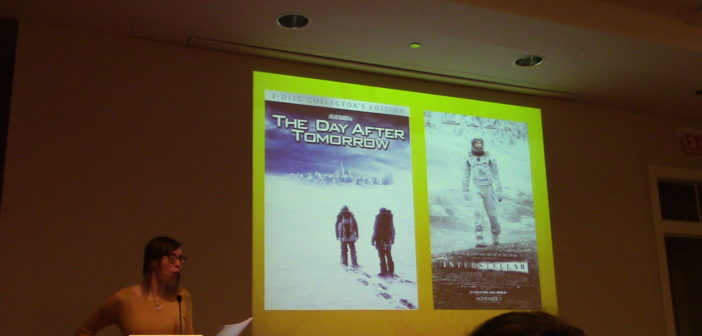Michelle Yates, an assistant professor of humanities, history and social science at Columbia College Chicago gave a presentation about masculinity and prevalent white male hegemony in climate-crisis films. Yates visited North Central on Feb. 9 at Smith Hall. In her presentation, Yates used films like, “The Day After Tomorrow,” “Interstellar,” “Soylent Green” and “Mad Max: Fury Road” to make her case. She discussed wild nature and capitalist progress run amok, labeling the narratives as Edenic recovery, or trying to return to the perfection found in Eden.
The biggest problems Yates had with the first three films mentioned had to do with the nostalgia in the films for a white male hegemony. She points to “Soylent Green” in particular, even though it is not initially thought of as a climate fiction film, but because of the climate undertones, such as ocean acidification industrialization and dialogue from the characters. According to Yates, the climate crisis is the result of capitalist progress gone wild.
“Cold like winter used to be,” Shirl from “Soylent Green” says to Detective Thorn in reference to the air conditioning. In bringing up “eco-memories” the films pushes us to conserve our nature.
Nostalgia allows “Soylent Green” to function as a cautionary tale. Yates points out a race and gender dimension. The first photos show pastoral settings with predominantly white people. It is viewed by Yates as a nostalgic representation of white people. Images of industry and waste speed by even though these images are more racially diverse; Yates claims this is the depiction of the urban jungle as the end of nature.
Sol is an older white former professor who serves as a mentor to the main character Detective Thorn. The implication is that Sol would have power, but he now lives in a dilapidated apartment.
Sol experiences 20 minutes of pristine Edenic nature in movie theater style, when he opts for assisted suicide rather than reveal the secret of Soylent Green. Yates on the other hand had no qualms about revealing the answer to the big question plaguing the entirety of the classic film: what is the secret of Soylent Green? The spoiler was arguably not necessary to her argument, as it was the events that lead up to the dystopian setting that are of relevance to the environment and societal structure. Yates claims these movies promote the idea that we are able save ourselves if we reinvest ourselves in the dominant notions of race and gender.
In her discussion of “Mad Max: Fury Road” this is turned on its head due to the closeness of femininity and nature. The War Boys being symbolic of white masculinity are ultimately defeated and uprooted, even though there is no green space left to preserve as well as no eco-memories. Instead, Max is haunted in the wasteland by those he couldn’t save, most of whom were marginalized.
Yates points out that Max, through his embodiment of white masculinity, has to go somewhere else. In a post-patriarchal society what do we do with white masculinity? According to Yates, it asks the question: what place does white masculinity have in a post-patriarchal society?

